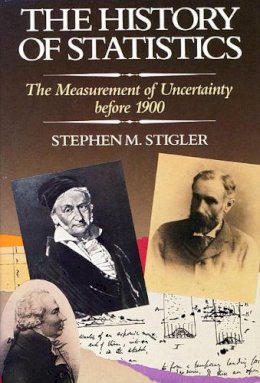
The History of Statistics
Stephen M. Stigler
This magnificent book is the first comprehensive history of statistics from its beginnings around 1700 to its emergence as a distinct and mature discipline around 1900. Stephen M. Stigler shows how statistics arose from the interplay of mathematical concepts and the needs of several applied sciences including astronomy, geodesy, experimental psychology, genetics, and sociology. He addresses many intriguing questions: How did scientists learn to combine measurements made under different conditions? And how were they led to use probability theory to measure the accuracy of the result? Why were statistical methods used successfully in astronomy long before they began to play a significant role in the social sciences? How could the introduction of least squares predate the discovery of regression by more than eighty years? On what grounds can the major works of men such as Bernoulli, De Moivre, Bayes, Quetelet, and Lexis be considered partial failures, while those of Laplace, Galton, Edgeworth, Pearson, and Yule are counted as successes? How did Galton’s probability machine (the quincunx) provide him with the key to the major advance of the last half of the nineteenth century?
Stigler’s emphasis is upon how, when, and where the methods of probability theory were developed for measuring uncertainty in experimental and observational science, for reducing uncertainty, and as a conceptual framework for quantitative studies in the social sciences. He describes with care the scientific context in which the different methods evolved and identifies the problems (conceptual or mathematical) that retarded the growth of mathematical statistics and the conceptual developments that permitted major breakthroughs.
Statisticians, historians of science, and social and behavioral scientists will gain from this book a deeper understanding of the use of statistical methods and a better grasp of the promise and limitations of such techniques. The product of ten years of research, The History of Statistics will appeal to all who are interested in the humanistic study of science.
Product Details
About Stephen M. Stigler
Reviews for The History of Statistics
Morris Kline
New York Times Book Review
An exceptionally searching, almost loving, study of the relevant inspirations and aberrations of its principal characters James Bernoulli, de Moivre, Bayes, Laplace, Gauss, Quetelet, Lexis, Galton, Edgeworth, and Pearson, not neglecting a grand supporting cast… The definitive record of an intellectual Golden Age, an overoptimistic climb to a height not to be maintained.
M. Stone
Science
In this tour de force of careful scholarship, Stephen Stigler has laid bare the people, ideas, and events underlying the development of statistics… He has written an important and wonderful book… Sometimes Stigler’s prose is so evocative it is almost poetic.
Howard Wainer
Contemporary Psychology
The book is a pleasure to read: the prose sparkles; the protagonists are vividly drawn; the illustrations are handsome and illuminating; the insights plentiful and sharp. This will remain the definitive work on the early development of mathematical statistics for some time to come.
Lorraine J. Daston
Journal of Modern History
Stigler’s book exhibits a rare combination of mastery of technical materials, sensitivity to conceptual milieu, and near exhaustive familiarity with primary sources. An exemplary study.
Lorraine Daston
